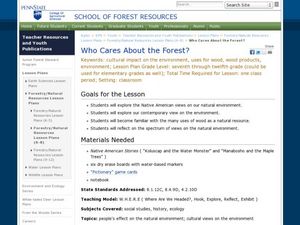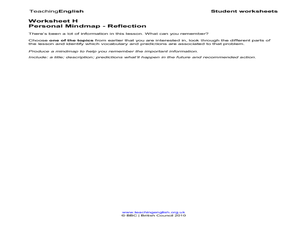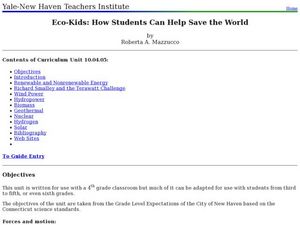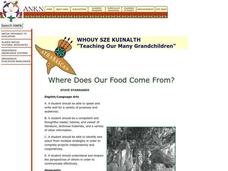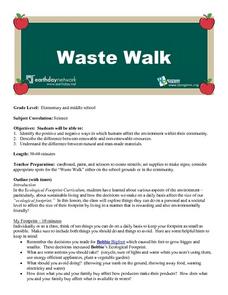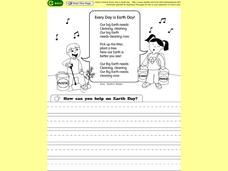National Science Teachers Association
Using Concept Maps in the Science Classroom
A good concept map requires high thought processes. This makes it a great tool for teaching and evaluating your pupils. A helpful article describes a great approach for teaching young scholars the art of concept map building and how best...
Indiana Department of Education
Social Emotional Learning Competencies PK-12 Lesson Plans
Looking for lesson plans that address social and emotional learning competencies? Here's help in the form of a 166-page packet that includes lesson plans for elementary, middle, and high school learners. Seven detailed plans are provided...
Curated OER
Who Cares About the Forest?
Students explore the natural environment and people's views, in particular the Native Americans. In this environment instructional activity students discover the many uses of wood as it pertains to our natural resources.
Curated OER
Hector's World - Heros
Students read the the story Heroes in order to navigate the Internet safely. In this Hector's World lesson plan, students examine the importance of checking with an adult before participating in the online environment. Students explore...
Curated OER
ESL: Environmental Problems
In this ESL environmental problem worksheet, students work with a partner to explain a set of terms, then divide a set of words that have to do with the environment into syllables.
Curated OER
Green House Effect
Young scholars read about the green house effect and how our environment is deteriorating and what we can do to help it. In this green house effect lesson plan, students conduct a home and school energy audit, and create a rap.
Curated OER
The Environment and You
First graders examine the human environmental impact and discover ways to lessen effects. They create a pollution damage flow chart and write down what they think Mother Earth might say. They create inventions from recyclable materials.
Curated OER
The Environment
Students, while engaged in a group discussion, collaborate a mini-project on environmental issues at home and/or in the classroom as well as incorporating environmentally related words and expressions within their daily diary writing...
Curated OER
Energy in a Clean Environment
Students identify and describe the different types of energy and how it is transferred. For this energy lesson students complete several activities including how to calculate joules, adding up wattage, and create a presentation on...
Curated OER
Homeless in our Community
Third graders explore homelessness in their local community. In this service project/social studies lessons, children research local areas where homeless people reside, discuss global acceptance and unity, and visit a local food bank.
Curated OER
Our Side of the Story: African Americans Share Their Experiences of Slavery
Seventh graders listen to a variety of folktales sharing experiences of slavery. As a class, they compare and contrast reading a story and telling a story. They participate in a role play activity to discover the journey of a slave and...
Curated OER
Eco-Kids: How Students Can Help Save the World
Fourth graders identify the different types of renewable and nonrenewable energy sources. In this ecology lesson, 4th graders create models of wind mills and hydropower. They discuss the pros and cons of using alternative forms of energy.
Curated OER
Polluting the Environment
Fourth graders construct mini-ecosystem, pollute the ecosystem, observe, collect, and record data on the effects of these pollutants on their ecosystem, organize data on spreadsheets, create graphs, and design presentations to share with...
Curated OER
Adaptations to Environments with Mammals
Fifth graders, after viewing a PowerPoint on different mammals, analyze what a biome is. Then they choose a mammal to research and go outside to feel the grass and leaves and hypothesize about which biome they live in as well as its...
Curated OER
WHERE DOES OUR FOOD COME FROM?
Students examine the sources, location and availability of local food, develop mapping skills, interact with Elders to gain pertinent information, and examine subsistence issues of the past and present.
Curated OER
How Do Artists Get Their Ideas? Culture and Environment as Sources of Ideas
Students share the difficulties they have in determining what to write or draw for a project. In groups, they view examples from three different artists and discuss how their personal experiences affected their art. They brainstorm a...
Curated OER
How Pollution Disrupts Our Natural Environment
Students conduct experiments to illustrate global warming. In this air pollution lesson, students first examine how a layer of greenhouse gasses might impact the earth's atmospheric temperature, then evaluate how the layer of gasses...
Curated OER
Investigating Our Place in the World
Students study the concept of geography in a year long unit. In this geography unit, students participate in different activities that explain the spatial sense of the world, the physical landmasses and bodies of water, geographic...
Curated OER
The Consequences of Our Consumer Behavior - Toys And Games
Students examine how consumer information can protect consumers from unsafe products. They identify popular games and toys, discuss labelling, role-play sharing and playing safely with toys, and plan and design their own safety...
Curated OER
Surviving in Our Ecosystems
Third graders identify the characteristics of a frog and compare them to a human child. They draw and describe the best environment for a human to live in and the best environment for a frog to live in based on their physical...
Curated OER
Environment: Waste Walk
Pupils assess the positive and negative affects of humans on the environment. The lesson explores ways in which individuals and societies can reduce the negative impact on the environment. By taking a "waste walk" around their campus,...
Curated OER
The Water in Our Lives: Be the Bug
Students examine a local water supply and create a fictional invertebrate specifically adapted to thrive in that environment. They write a short story from the invertebrate's point of view.
Starfall
Every Day is Earth Day
For this environment worksheet, students read a poem called "Every Day is Earth Day." Students also write about how they can help on Earth Day.
Curated OER
A Tree Is More than a Street Name
Eighth graders discuss the role of trees as one of the most important natural resources. In groups, they examine how the forests nearby helped to shape their urban city. Using the internet, they research the use of the forest in early...




